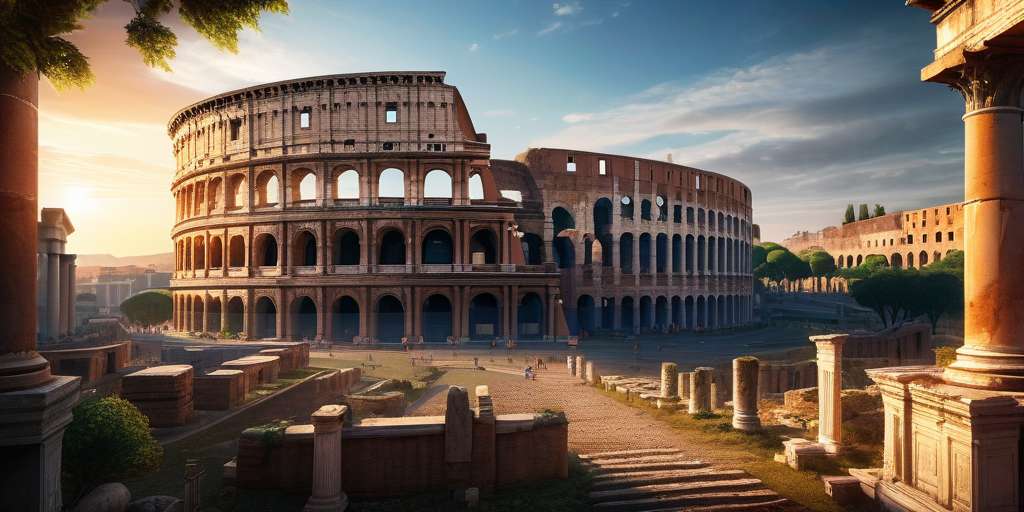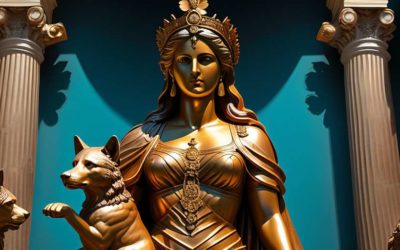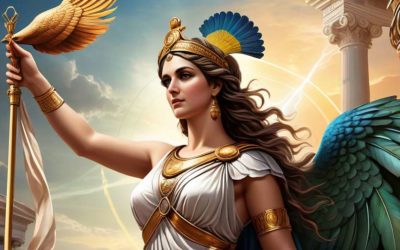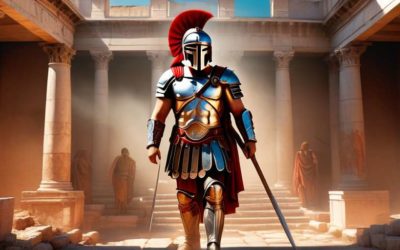Roman Mythology

Roman mythology, inspired by Greek mythology but with its own adaptations, reveals a rich tradition of gods and legends.
Jupiter, Mars and Venus are some of the prominent gods in this divine pantheon, but there are many more.
The myths of the founding of Rome, such as the story of Romulus and Remus, are fascinating examples of this narrative.
Likewise, the influence of other cultures on Roman mythology and its importance in history are reflected in art and literature.
Read on and discover with us this exciting mythological universe.
Roman gods and their importance
Roman mythology presents us with a fascinating pantheon of gods and goddesses that played a fundamental role in Roman life and culture.
These deities personified different aspects of existence, from natural phenomena to abstract concepts.
Among them are Jupiter, Mars and Venus, who occupy a prominent place in this ancient religion.
Jupiter, king of the gods
Jupiter, also known as Zeus in Greek mythology, had a supreme role in the Roman pantheon.
He represented divine power and authority, being considered the father of gods and men.
Jupiter was revered as the god of the sky and lightning, symbol of protection and justice.
His influence in Roman mythology was indisputable, accompanied by stories and attributes that highlighted his majesty and power.
Mars, the god of war
Mars occupied a prominent place as the god of war in Roman mythology.
Equivalent to the god Ares in Greek mythology, Mars represented bravery, ferocity and military strategy.
He was worshipped and revered by the Romans, who saw him as a protector in times of conflict and a symbol of the empire’s military greatness.
Venus, the goddess of love and beauty
Venus personified love and beauty in Roman mythology, being the equivalent of Aphrodite in Greek mythology.
She was worshipped as the goddess of seduction, passion and fertility.
Venus played an important role in Roman daily life, being honored with festivals and rituals dedicated to exalt her influence.
Beauty and love were values cherished by Roman society and Venus embodied the essence of these concepts.
Other important deities in Roman mythology
- Diana (Artemis): goddess of hunting and chastity.
- Mercury (Hermes): god of commerce, travelers and thieves.
- Neptune (Poseidon): god of the oceans and earthquakes.
- Minerva (Athena): goddess of wisdom, military strategy and the arts.
- Bacchus (Dionysus): god of wine, fertility and festivity.
- Vesta: goddess of the hearth and sacred fire, protector of Rome.
These are just some of the many deities that made up the Roman mythological pantheon.
Each of them had its own sphere of influence and was venerated on different occasions through rituals and festivities.
Their importance in Roman culture and history was fundamental, shaping the beliefs and values of this ancient civilization.
Myths and legends of Roman Mythology
There are many stories, myths and legends that make up the rich tradition of Roman mythology.
Below, we highlight some of them.
The founding of Rome: Romulus and Remus
One of the best known myths is that of the foundation of Rome by the brothers Romulus and Remus.
According to legend, they were abandoned in the Tiber River and rescued by a she-wolf who fed them.
Raised on the Palatine Hill, the brothers grew up and decided to establish their own city.
However, disputes arose and Romulus murdered Remus, becoming the first king of Rome.
Jupiter and Juno: divine power in Roman mythology
Jupiter, the king of the Roman gods (equivalent to Zeus in Greek mythology), represents power and protection. Juno, his wife and sister (equivalent to Hera), personifies marriage and the ideal Roman woman.
These two gods play a fundamental role in Roman myths and legends, with stories that tell of their love, jealousy and intervention in human affairs.
Minerva and Mars: gods of wisdom and bravery
Minerva (Athena in Greek mythology) personifies wisdom and military strategy in Roman mythology.
She is known for her support of heroes and her prowess in arts and science.
Mars (Ares in Greek mythology) is the god of war and bravery, and is revered by the Romans as the protector of soldiers in battle.
The stories of Minerva and Mars reveal the importance of intelligence and courage in Roman society.
The influence of other cultures on Roman mythology
Roman mythology, although rooted in Greek mythology, was not limited to a single cultural influence.
Interaction with other conquered civilizations also left its mark on Rome’s rich mythological tradition.
Dialogue between Roman and Greek mythology.
Greek mythology had a significant impact on Roman mythology.
The Romans adopted many Greek gods and goddesses and incorporated them into their own imaginary, giving them new names and adapting part of their identity.
This exchange between two cultures deepened the connection between the two belief systems and enriched Roman mythology.
Foreign gods and their integration into the Roman religion
In addition to Greek mythology, the Romans also adopted elements from other cultures as they expanded their empire.
Deities from Egypt, such as Isis and Osiris, and from other conquered civilizations, were incorporated into the Roman pantheon.
These foreign gods were integrated into Roman religion, often assimilating them into existing Roman deities or attributing similar roles and functions to them.
The richness of cultural influence in Roman mythology
- Beliefs and divinities from Egyptian, Etruscan and other civilizations intertwined with Roman mythology, adding layers of complexity and meaning.
- This integration of different cultural influences reflected the diversity of the Roman Empire and its ability to assimilate and adapt different religious traditions.
Religious syncretism in Roman mythology
Religious syncretism, that is, the fusion of different religious beliefs and practices, was a prominent feature of Roman mythology.
This mixture of cultural and religious influences showed the adaptability of Roman society, as well as its willingness to accept and assimilate the traditions of other peoples.
The importance of Roman mythology in culture and history
The influence of Roman mythology on art and literature
Roman mythology has left a deep imprint on the world of art and literature over the centuries.
Roman artists and writers, inspired by the myths and legends that make up this rich tradition, have created masterpieces that endure to this day.
In the realm of art, depictions of Roman gods adorn temples, sculptures and frescoes throughout the Roman Empire.
Artists used Roman mythology as a source of inspiration to capture divine beauty and express philosophical and religious ideas.
Depictions of gods such as Jupiter, Mars and Venus are among the most iconic of the Roman era.
In literature, the myths and legends of Roman mythology have been the source of countless masterpieces.
Epic poems by authors such as Virgil and Ovid tell stories of gods and heroes who embody Roman values and virtues.
These literary works not only entertained audiences of the time, but also conveyed important moral and political messages.
Roman mythology as a reflection of Roman values and beliefs.
Roman mythology was not only a set of stories and beliefs, but also reflected the fundamental values and beliefs of Roman society.
The gods and goddesses personified different aspects of life and natural phenomena, but also embodied virtues and virtuousness that were highly valued by the Romans.
For example, Jupiter, the king of the gods, was a symbol of power and leadership.
Mars, the god of war, represented the bravery and military spirit that were so important in ancient Rome.
Venus, the goddess of love and beauty, personified physical beauty but also sensuality and romantic love.
These gods and their attributes were venerated and worshipped on different occasions, such as religious festivals and rituals.
Participation in these religious practices strengthened social ties and reinforced Roman identity.
The Capitoline She-Wolf: Romulus and Remus, the foundation of Rome
The Capitoline she-wolf, a prominent figure in the history and mythology of Rome, suckled Romulus and Remus, the founders of the city. The bronze statue dedicated to her, also called “Luperca” is in the Capitoline Museums in Rome. Although it was believed to be...
Juno, goddess, protector of women and symbol of power.
The goddess Juno is a prominent figure in Roman mythology, especially related to the protection of women and feminine aspects. Worshipped along with Minerva and Jupiter, Juno plays an important role in Roman religion. In addition, various names and roles are...
The god Mars, powerful defender of Rome
The god Mars, a prominent figure in Roman mythology, was the protector of Rome and its way of life. Considered the second most important god after Jupiter, his role was to defend the limits and borders of the city, as well as to protect the fields and crops. He is...
Subscribe
If you want to receive in your mailbox stories, curiosities and legends of the most fascinating creatures of classical mythology just fill in this form.

Classical Mythology
mitologiaclasica.com is a website dedicated to explore and spread the fascinating richness of mythology, offering a vast compendium of stories, characters and legends.
Madrid, 2023
info@mitologiaclasica.com
Explore
Greek Mythology
Roman Mythology
Norse Mythology
Egyptian Mythology
Hindu Mythology
Chinese Mythology
Japanese Mythology
Celtic Mythology
Privacy Policy
Privacy Policy
Copyright mitologiaclasica.com


